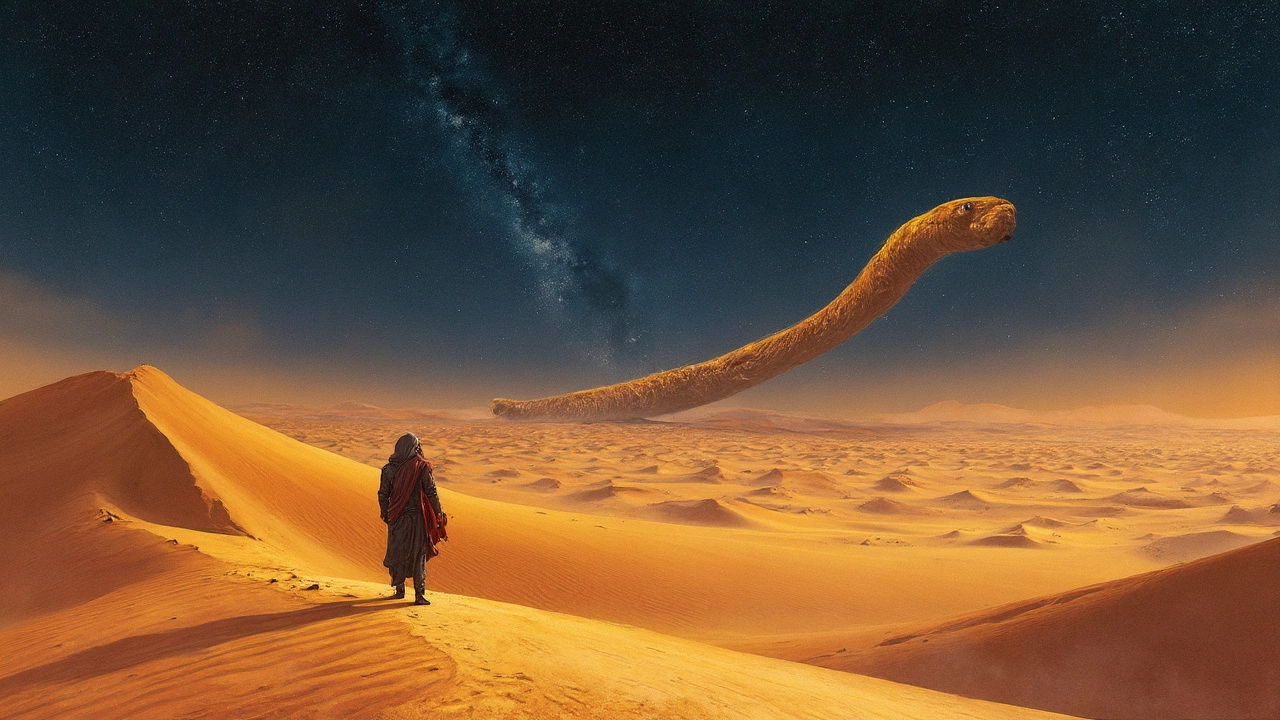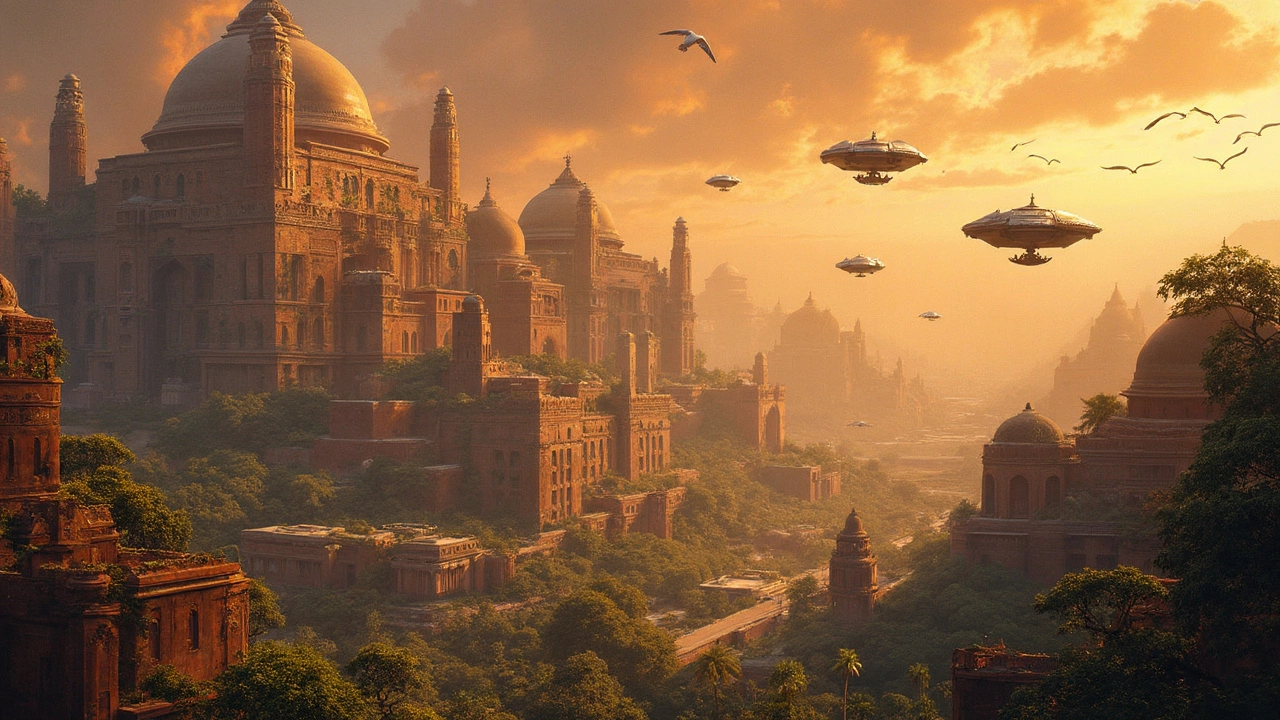
Ever grabbed a book and wondered what world it would throw you into? Well, Frank Herbert's 'Dune' is one of those books that makes you scratch your head: is it science fiction, or does it teeter on the edge of fantasy? It’s got spaceships zooming across galaxies but also some seriously mystical vibes. So, let's jump into what makes 'Dune' such a head-scratcher.
Let's start with the sci-fi elements. We’ve got futuristic tech, like spaceships and terraforming abilities, as you'd expect from something labeled 'science fiction.' But that’s not all there is to it. If you dig deeper, the story kicks up some crazy political drama, where massive interstellar houses fight for power. It's like watching a space-age Game of Thrones, with more sand and giant worms.
- The Story Behind Dune
- Sci-Fi Elements
- Fantasy Elements
- The Mix of Genres
- Impact on Readers
- Final Thoughts on Dune's Genre
The Story Behind Dune
Imagine being stuck in a desert with only massive sandworms for company, and you've just stepped into the world of Dune. Written by Frank Herbert way back in 1965, it's not just a story about interstellar politics but feels more like a saga of power, betrayal, and survival. What makes Dune stand out is how it combines environmental themes with a power struggle that's all too relatable even today.
Herbert was inspired by the sand dunes of the Oregon coast. He didn’t just sit in some quiet corner dreaming this stuff up—no, he spent years researching. His trip to Oregon's dunes stoked the idea of a desert planet named Arrakis, where the precious spice melange is everyone's top priority. And this isn't herbal tea spice; it's mind-bending, life-extended stuff that fuels space travel.
The plot kicks off with Paul Atreides, a young noble groomed to take over his family’s stewardship of Arrakis. It seems simple, right? Except it’s full of twists and turns you wouldn’t see coming. It’s got politics, prophecy, and these mystical Bene Gesserit witches with their 'voice' powers that would make any Jedi raise an eyebrow. And did we mention the addictive spice?
Frank Herbert took plenty of risks when crafting Dune. Publishers rejected it 20 times. Crazy, huh? When it did hit the shelves, thanks to a publisher best known for car repair manuals, it somehow struck gold. 'Dune' ended up winning the Hugo Award and the inaugural Nebula Award, officially sealing its fate as a game-changer in both sci-fi and fantasy genres.
What's fascinating is that the book dives deep into zeroing in on ecology, a relatively untouched theme in the realm of mythological fiction back then. Herbert was ahead of the time, weaving environmental warnings into a gripping narrative. It's like he wanted to slap a 'save the planet' sticker onto everyone's mental wall without being preachy.
Sci-Fi Elements
Now, when folks say Frank Herbert's Dune is sci-fi, they're onto something. I mean, picture this: a sprawling universe with advanced tech flying through the cosmos. That's what sci-fi is all about, right? 'Dune' dishes up some of the coolest tech concepts like complex space travel via something called 'the Guild' that manages interstellar transport using a spice-induced method. We're talking about bending space itself! Imagine that.
And when it comes to planets, forget about Earth. The story unfolds on fantastical planets, with Arrakis being the biggie. Known as Dune, Arrakis is largely barren and harsh but holds the universe’s most valuable resource: 'spice'—officially named 'melange.' This substance doesn't just make space travel possible; it enhances human mental capacities. It's like a 21st-century energy drink but on cosmic steroids.
The universe Minotaur also draws its power balance from various technological advancements. Consider the personal shields characters use—they can deflect fast-moving objects. Don't picture lasers and guns here; because of these shields, combat goes up close and personal, making swords more practical than you’d think in a futuristic setting.
Architecture and living conditions reflect more of that sci-fi edge. Gigantic structures and palaces, with high-tech facilities governed by AI systems and biological sensors, mix traditional and futuristic vibes. It's like reading a history book that’s also predicting the future.
Fantasy Elements
When you dive into the world of Dune, you’re not just exploring a desert planet; you’re stepping into a realm that feels almost magical. Even though it's set in the future, there’s a layer of mystique that’s more about myths and legends than lasers and gadgets.
One of the most fantastical elements is the concept of the Bene Gesserit, a powerful sisterhood with abilities that could make you think more of witches than advanced scientists. These ladies wield power over others through their mythical-sounding Voice, which allows them to control people just by speaking to them. It's as if they've got some ancient spell-casting going on, lending the story a mysterious edge.
Then there’s the spice, or “melange,” a vital component of the story. Sure, it’s a resource that makes interstellar travel possible. But it’s also got these qualities that seem straight out of a fairy tale. It enhances your mental abilities and extends life, sounding a lot like that legendary philosopher's stone everyone always talks about in fantasy books.
Let’s not forget about the mythology woven into the fabric of Arrakis, the desert planet itself. The Fremen, the indigenous people, treat the sandworms almost like mythical beasts. You can spot clear parallels with legendary dragons of ancient tales. And then there's Paul Atreides’ journey — it's got more than a whiff of the epic hero's quest. It feels like you're reading some ancient myth handed down through generations.
So, while Dune might be packaged as science fiction, it's steeped in fantasy lore. That's what makes it so intriguing; it's not just one thing. It's this blend, these fantasy elements, that adds so much richness and depth, making it a story you can't quite pin down and that's why it's still talked about as a mind-bending saga.

The Mix of Genres
So, where does 'Dune' draw the line between sci-fi and fantasy? It's a tightrope walk, really. Let's break it down.
On the surface, 'Dune' ticks many boxes you'd expect from sci-fi. It’s set on the desert planet of Arrakis, where technology and science play big roles. Spaceships cruise across galaxies, and there's advanced tech like force fields and spice harvesters. This spice, by the way, is not your grandma's cinnamon—it’s a powerful substance that makes interstellar travel possible and fuels the empire's entire economy.
But then, 'Dune' throws you curveballs with its fantasy vibes. The whole world feels pretty mythical. There's a strong emphasis on prophecy, ancient rituals, and mystical themes like mind control and foresight. The Bene Gesserit, a powerful sisterhood, uses voice and intuition in ways that feel more wizard than science. The story dives into messianic prophecy with Paul Atreides, who could be the Kwisatz Haderach—a kind of chosen one.
Frank Herbert skillfully blends mythological fiction with high-stakes corporate espionage, making it way more than just spaceships and ray guns. Readers are drawn into a universe where politics are tangled with religion and ecology. This blend is what makes 'Dune' stand apart. Unlike typical sci-fi that leans heavily on gadgets and tech-talk, 'Dune' envelops us in a narrative where planets, beliefs, and prophecies weave together.
'Dune' doesn’t just mix genres; it questions them. The story suggests that science can have an almost magical impact on society. It's not just about the technology you have, but how you use it and view it.
All this makes 'Dune' an incredible journey into the unknown with elements that feel ancient yet futuristic. It challenges us to rethink what we know about both fantasy and science fiction, blending them into something uniquely unforgettable.
Impact on Readers
Dune isn’t just a book you read; it’s an experience that kind of stays with you. You can see it in sci-fi and mythological fiction discussions circles—folks are always talking about how it changed their view on stories about worlds and fantasy.
What's fascinating is how Dune pulls readers into thinking about serious stuff like politics, ecology, and religion. It's set on Arrakis, a desert planet where water is scarce, pushing readers to think about environmental issues, possibly more relevant today than when it was published back in 1965. The way Herbert dives into resource scarcity taps directly into current environmental concerns.
“Herbert’s genius is that he didn’t just write a science fiction novel; he created a fully formed universe,” said Neil Gaiman, an author who's no stranger to blending genres himself.
Then there's the character impact. The story introduces us to Paul Atreides, who becomes a messiah-like figure, which brings loads of character growth and moral dilemmas. Readers sometimes relate his journey to personal challenges, making the story feel very personal despite its scale.
From a cultural perspective, Dune has inspired a whole bunch of other works—not just books, but movies and TV shows too. Think about all those desert planets you’ve seen in space movies. That imagery? It’s got Herbert’s fingerprints all over it.
Here's a fun fact: The novel's exploration of power and governance even popped up in real-world discussions. For instance, some strategists and environmentalists have used Dune as a framework to analyze resource-driven conflicts.
So yeah, Dune leaves an impact that's as lasting as the spice that everyone in the book wants so badly. Whether you see it as a work of sci-fi or fantasy—or a mix of both—its effect on readers and culture is undeniable.
Final Thoughts on Dune's Genre
So, where does 'Dune' really sit on the fantasy-sci-fi see-saw? It’s a wild mix, and that's what makes it stand out. Some fans argue it’s more of a science fiction tale because of the advanced technology, space travel, and ecological themes. Dune indeed paints a future where technology affects every aspect of life. But wait, there’s more! The fantasy buffs won’t be left out either because it’s packed with rich mythology, prophecy, and the mystical ability of certain characters to see the future or control others' minds.
It’s kind of like Herbert took a sci-fi landscape and sprinkled it with fantasy dust. For instance, consider the Bene Gesserit, a secretive female order with mind-bending abilities. Coupled with the spice melange, which grants almost magical capabilities to those who ingest it, you're transported into a world where sci-fi and fantasy beautifully coexist.
This balancing act of worlds isn't just about themes but also impacts how readers perceive the story. It challenges our typical genre classifications. But here's the kicker: that's precisely why Dune remains powerful. It's got the sci-fi allure for tech heads and an epic scale for those craving fantasy’s grandeur.
But does it even matter what label you give it? Maybe not. What counts is that 'Dune' has captivated audiences since 1965, proving a story doesn't have to fit neatly into a single genre box to be unforgettable. The blending of genres might just be Dune's secret spice, drawing in readers who thrive on complexity and sweeping narratives.


